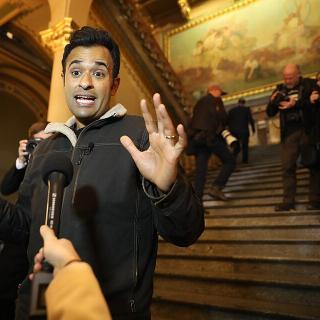A host of voter suppression and voter purging strategies serendipitously put into play by Republican state super-majorities could derail any hopes of a Blue Wave.
Since 2008, 23 states passed legislation that puts tougher restrictions on voting, such as stricter voter ID laws and more aggressive voter purge requirements, this according to the Brennan Center for Justice.
We at the Free Press say these Republican strategies were inspired by their disbelief an African-American could ever (or should ever) win the White House.
In Wisconsin, for instance, a stricter voter ID law convinced thousands of urban voters to forego the 2016 election because they believed they did not have qualifying ID when in fact they did. Trump won Wisconsin by 22,000 votes.
And here in Ohio, where the governor’s race is neck and neck, the nation’s strictest voter purge process could easily cost Democratic candidate Richard Cordray the election. Several million, again mostly from urban areas, are estimated to have been purged over the previous decade in Ohio.
“Without a doubt, the stripping of voter rolls, which disproportionately impacts Democrats, is the precursor for Republicans winning close elections,” says our own Bob Fitrakis, who co-wrote the book The Strip and Flip Selection of 2016: Five Jim Crows and Electronic Election Theft.
The stakes are high. Every US House of Representative seat and 35 Senate seats are up for election on November 6th. In addition there are 36 governor races along with numerous local elections and state issue votes. A Washington-Post/Schar School poll taken the third week of October shows 48 House races in congressional districts that went Trump in 2016 are essentially running even.
What is appearing more and more apparent is that voter suppression and purge efforts by Republicans are ongoing in practically every state and not just traditional voting battle grounds.
In Georgia, for instance, the Associated Press in October found Republican Brian Kemp’s Secretary of State’s office, which enforces the state’s voting laws, attempted to block 53,000 voter registration applications. Seventy percent of the applications were from African-Americans, and were held up for something as fastidious as a mismatching signature when compared to state records.
Soon after the signature issue, voting-rights activist Greg Palast found Kemp’s office had purged over 500,000 registered voters because they either moved to another state or country. But Palast found 340,000 of those purged never moved and still resided at the address listed on their registration.
Worse is how the numbers of wrongly purged Georgia voters could be much higher. Georgia removed 1.5 million voters between the 2012 and 2016, and half that number between 2008 and 2012, according to the Brennan Center for Justice.
Kemp of course is running for governor against Democratic Stacey Abrams, an African-American.
Kemp took office in 2010 and how his office purged these voters is what Palast has called “purge by post card”. The same strategy used in Ohio and ruled legal by the conservative US Supreme Court this past summer.
Kemp’s Secretary of State’s office was sending a post card to voters who did not vote in a two previous federal elections, both primaries and Presidential. If the voter did not return the post card, they were removed.
What’s beyond troubling is that Ohio’s Secretary of State and election overseer, Republican Jon Husted, is also running for election on the state’s gubernatorial ticket.
“With these Secretary of States running there is an inherent conflict of interest. It wouldn’t be allowed in virtually any decent democracy in the world,” he says. “And in a state that requires ID, why would you be purging anyone if they have to show ID that matches the address in the book?”
The strategy to suppress left-leaning voters goes far beyond states where Republicans have a super majority. There’s the national Crosscheck program, for instance, and even though it was suspended in December of 2017 due to online security vulnerabilities, its influence on the mid-terms could be profound.
Crosscheck was initiated in 2005 by the far-right Republican Kris Kobach of Kansas who at the time was the state’s secretary of state. It was created to combat mass voter fraud by checking state voter databases to see if voters were casting multiple ballots across state lines.
Greg Palast found over its history, Crosscheck had flagged 7.2 million voters, a majority being Latino or African-American, for the suspicion of double voting, but only 4 of these voters had actually casted two ballots.
The big problem is, once a registered voter is flagged as a “false positive” by Crosscheck, their chances of being purged skyrockets, says Jeff Radue, a member of the Crosscheck action team for Indivisible, a national grass-roots progressive movement to defeat the Trump agenda.
Indiana is a state with a Republican super majority and in 2017 passed a law that allowed election officials to cancel voter registrations based on data provided by Crosscheck. Radue says Crosscheck may have helped purge 600,000 voters from Indiana.
Earlier this summer a federal judge blocked the Indiana law, but Radue says the full affect of Crosscheck may not be felt until after the mid-terms. Kobach, for example, is running for governor of Kansas and polls show the race virtually tied.
“Crosscheck is just one tool Kobach has harnessed in his favor for him to position himself to win elections,” says Radue. “Voter suppression efforts in states like Georgia and Kansas are highlighting the extent Republicans will go to win when they are in control of the voting apparatus at the state level.
“They will purge voters. They will suspend registrations. They will lose absentee ballots. And will do so in the name of voting fraud.”
Radue says voting-rights groups like the ACLU and Common Cause can continue to push back by challenging the increasing number of voter suppression laws passed on the state level, but the future looks troubling.
“These lawsuits will be kicked-up to the Supreme Court and that’s why the Supreme Court situation with Brett Kavanaugh was so devastating because there’s a really a strong chance they are going to rule in favor of these voter suppression efforts,” he says.
Like the Wisconsin voter ID law that was found to persuade many to not vote when they actually had the proper ID, perhaps Georgia Democratic governor candidate Stacey Abrams says it best about the affect voter suppression has overall.
“Voter suppression isn’t only about blocking the vote,” she said during a recent debate. “It is also about creating an atmosphere of fear, making people worry that their votes won’t count.



